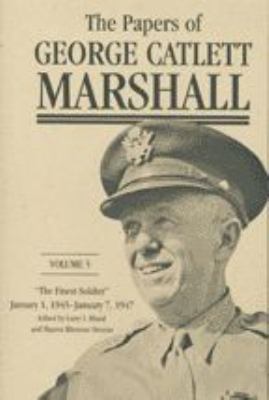
Book
|
The papers of George Catlett Marshall.
Copies
59 Total copies, 59 Copies are in,
0 Copies are out.
Title
The papers of George Catlett Marshall.
Call No
355.3310924
Authors
Subjects
Marshall, George C. (George Catlett), 1880-1959.
MARSHALL, GEORGE C. (GEORGE CATLETT), 1880-1959. CN
Marshall, George C., 1880-1959 (George Catlett), (DLC)n 79109883
Marshall, George C. (George Catlett), 1880-1959. fast (OCoLC)fst00043128
United States. Army--Biography.
United States. Army.
UNITED STATES. ARMY--BIOGRAPHY.
UNITED STATES. ARMY--BIOGRAPHY. CN
United States. Army--Biography. (DLC)n 79063202
United States. Army. fast (OCoLC)fst00533532
Generals--United States--Correspondence.
Generals--United States--Correspondence.
Generals--United States--Correspondence.
Generals.
Generals--United States--Correspondence.
Generals.
7.150.
(DLC)n 78095330 United States--History, Military--20th century--SOURCES.
United States--History, Military--20th century--Sources.
United States--History, Military--20th century--Sources.
United States.
Marshall, George Catlett,--1880-1959.
Marshall, George C.,--1880-.
Marshall, George Catlett.
United States.--Army.
Amerika.
Sources.
Personal correspondence.
Military history.
Biographies.
MARSHALL, GEORGE C. (GEORGE CATLETT), 1880-1959. CN
Marshall, George C., 1880-1959 (George Catlett), (DLC)n 79109883
Marshall, George C. (George Catlett), 1880-1959. fast (OCoLC)fst00043128
United States. Army--Biography.
United States. Army.
UNITED STATES. ARMY--BIOGRAPHY.
UNITED STATES. ARMY--BIOGRAPHY. CN
United States. Army--Biography. (DLC)n 79063202
United States. Army. fast (OCoLC)fst00533532
Generals--United States--Correspondence.
Generals--United States--Correspondence.
Generals--United States--Correspondence.
Generals.
Generals--United States--Correspondence.
Generals.
7.150.
(DLC)n 78095330 United States--History, Military--20th century--SOURCES.
United States--History, Military--20th century--Sources.
United States--History, Military--20th century--Sources.
United States.
Marshall, George Catlett,--1880-1959.
Marshall, George C.,--1880-.
Marshall, George Catlett.
United States.--Army.
Amerika.
Sources.
Personal correspondence.
Military history.
Biographies.
Language
English
Published
Baltimore : Johns Hopkins University Press, 1981-.
Publication Desc
2 volumes : illustrations, portraits ;
ISBN
0801825520
(vol. 1)
LCCN
81047593
Dimensions
24 cm.









